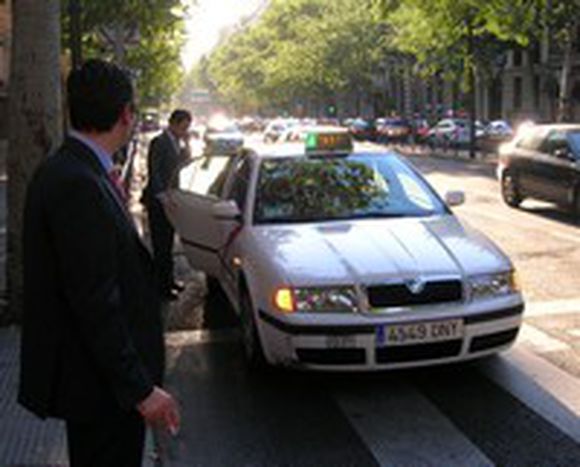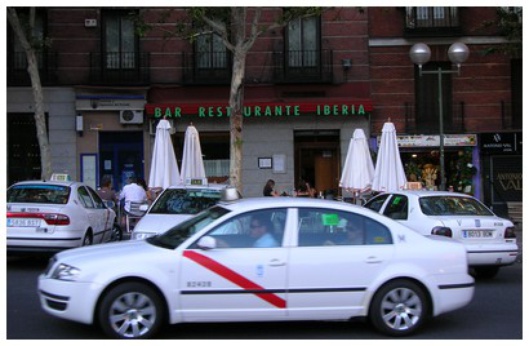
Mundology101: Madrid by taxi
Published on
Translation by:
 jonathon mellor
jonathon mellor
Ditch those stereotypes as we speed through the high paced Spanish rush hour in the back of a taxi – and get a lesson in common sense
After a few less than complementary comments questioning the character of journalists, taxi-driver Florencio Diaz Sierra – 49, single and originally from Cáceres in Spain’s western Extremedura region – agrees to chat as we drive around the crowded streets of Madrid. ‘Your luck’s in,’ he suggests, confidently but not without a hint of playfulness as we get into his taxi. ‘Cos I’ve studied mundology (‘worldology’).’ At 14, he left Cáceres to work in a hotel, ten years which gave him a good grounding mundology, the art of learning about life and dealing with the public. ‘If you don’t know how to treat your client, you’re no good for this kind of thing.’
The first surprise: all the stereotypes of the Spanish taxi driver go out of the window – no icons of virgins or saints hanging from the rear-view mirror, no football paraphernalia, no photos of the family, and no Radio Olé, the radio station favoured by taxi-drivers, which plays nothing but traditional Spanish folk music. Florencio’s car is very different from the Mambo-taxi caricatured by director Pedro Almodóvar in his Women on the Verge of Nervous Breakdown (1988), a symbol of the eighties.
Snapshot >of a sector
Winding in and out of the old buildings of the Gran Vía (one the city’s most emblematic streets), Florencio does away with another myth: the pessimistic, defeatist taxi-driver who believes that business in Spain is going through a crisis. It’s true that he, and others, would have reasons: in the last six months, petrol prices have gone up by 12% and a new law introducing the points system on the driving licence has left many of his colleagues in ruins. ‘This points system, it’s a cover-up. What they should do is have a go at the car manufacturers. 40, 000 deaths in Europe each year…what’s that if not a war? Life’s cheap in the face of money and capitalism.’ However, after twelve years driving a taxi, Florencio is quick to recognise that the current right-of-centre mayor of Madrid has treated the sector well, and that it’s going though good times at the moment.
Florencio, nothing like the stereotypical uneducated taxi-driver, explains his arguments coherently, reasonably, and with common sense. Approaching Atocha Railway Station, he recalls the terrorist attacks that took place there three years ago, and the way they have been used as a political tool in the media. ‘You have to read everything,’ he says. ‘I read El País, El Mundo, La Razón (the three major daily national newspapers in Spain). Whatever paper, regardless of its ideology. And I listen to all the radio stations – SER (generally listened to by people with left-of-centre leanings), la COPE (right of centre and owned by the Church), to make sure I’m well informed.’ I try to convince him of the independence of cafebabel.com although he is somewhat unmoved, suggesting that ‘well, you would say that, wouldn’t you?’
Women are better drivers than men
On the Castellana, just alongside the Santiago Bernabeu Stadium, home of Real Madrid Football Club, Florencio also disproves the sexist taxi-driver stereotype, as he believes that ‘women are better drivers than men. The problem is that many of them are afraid and so drive badly, but they are more careful than men: so those who aren’t afraid are better drivers.’
No-one doubts that the taxi sector is a sexist one. ‘And a right-wing (i.e. conservative and nationalist) one,’ asserts Florencio, who doesn’t come down on one side or another. At the same time, he recognises that Alberto Ruiz-Gallardón, the conservative mayor of Madrid, has managed the city well, and is critical of the liberal path Europe is on, ‘which could lead to the freeing up of the sector,’ about which he is nervous. In Spain, taxi licences can be transferred or sold, and each driver can have no more than three cars. ‘They’ve already tried to raise that number to six, but we all got together and made them leave it at three. If the sector becomes less strictly controlled, as they want it to be, that’ll be the end. The big companies will swallow up the little ones.’ Many in Madrid complain that they can’t find a taxi on Saturday night or alter a football match, but Florencio doesn’t believe that freeing up the sector would solve the problem. ‘It would increase the number of taxis but reduce our income.’
Journey’s end
Our pilgrimage around Madrid ends where it began, in a bar called Iberia, a legendary 24-hour meeting place, where taxi-drivers get together for a coffee. It’s also a place where young people have one for the road and hide from the sun’s first rays after a night out in the Spanish capital. The drunken party mood mixes with the indolence of the early-rising drivers.
 Our trip around Madrid’s streets has turned many stereotypes on their head. Florencio also wants to end his trip around the world and retire as soon as possible. ‘That’s why I do the lottery whenever I can,’ he jokes. ‘When I retire, I see myself back in Guadalupe, where I was born, with my little patch of land and my potatoes, a quiet life. But sure, I’d come back to Madrid now and then, for a bit of a party.’
Our trip around Madrid’s streets has turned many stereotypes on their head. Florencio also wants to end his trip around the world and retire as soon as possible. ‘That’s why I do the lottery whenever I can,’ he jokes. ‘When I retire, I see myself back in Guadalupe, where I was born, with my little patch of land and my potatoes, a quiet life. But sure, I’d come back to Madrid now and then, for a bit of a party.’
Translated from Madrid en taxi: curso de mundología


